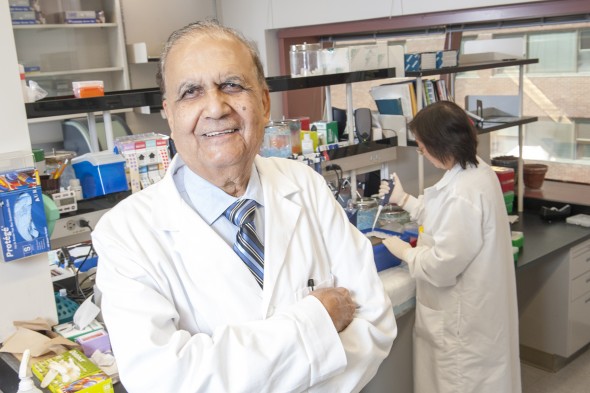Seeking neurobiological causes of teen suicide, depression

“Once we really know the biological causes of depression and suicide, we may be able to develop therapies,” says Ghanshyam Pandey. Photo: Roberta Dupuis-Devlin/UIC Photo Services
The University Scholar award, now in its 30th year, honors UIC faculty who are among the best in their fields — those who show superior performance and great promise in research and teaching. Winners receive $15,000 per year for three years.
“Once we really know the biological causes of depression and suicide, we may be able to develop therapies to treat depression and prevent suicide,” Ghanshyam Pandey says.
Pandey is professor of psychiatry and director of the Mood Disorders and Suicide Research program, one of the only research programs of its kind studying the neurobiological causes of teen suicide.
Pandey’s main research interests are the underlying biological causes of depression and suicide, especially in teenagers. He focuses on three main areas related to depression and suicide: neurotransmitters such as serotonin, the immune system and hormones.
He was one of the first researchers to discover that a subtype of serotonin receptor is often present at abnormal levels in the blood of depressed patients and in the brain tissue of suicide victims.
“This receptor is a valid biomarker for identifying people at a higher risk of suicide,” Pandey says. “Testing for levels of this receptor through a blood test can help these people get earlier preventive treatment.”
His studies of the hormones of the neuroendocrine system found that cortisol, a hormone produced in response to stress, doesn’t function properly in depressed people. They have abnormal levels of the hormone that causes the release of cortisol in the brain.
When Pandey turned his attention to the immune system, he found abnormal pro-inflammatory factors called cytokines in the blood and brains of people with depression and in brain tissue after death. He is currently investigating signaling pathways in bipolar disorder and inflammatory markers in suicide.
Pandey began studying mood disorders because he was interested in brain function. Through his interviews with depressed and suicidal teenagers, Pandey realized that their risk factors, behaviors and characteristics were different than adults.
“This observation led me to believe that the underlying neurobiology of teen suicide and depression should be studied separately, rather than considered to be similar to neurobiological findings from adult patients,” he says.
